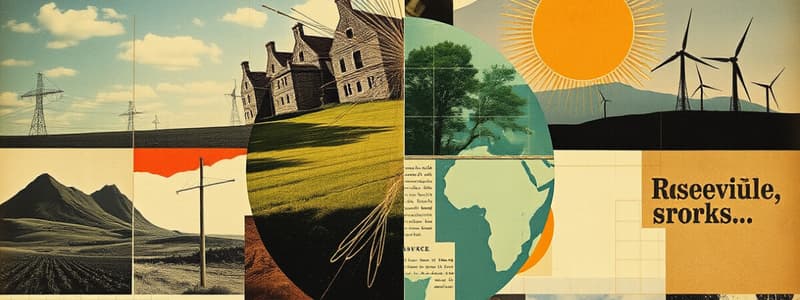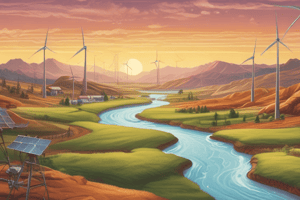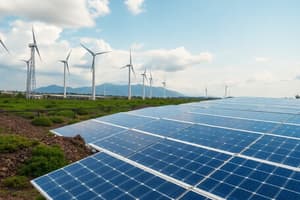Podcast
Questions and Answers
Nonrenewable resources are resources that are available in fixed quantities or are used up more quickly than they can be replaced. What is an example of a nonrenewable resource?
Nonrenewable resources are resources that are available in fixed quantities or are used up more quickly than they can be replaced. What is an example of a nonrenewable resource?
- Water
- Fossil fuels (correct)
- Solar energy
- Wood
Renewable resources are capable of being replaced by natural ecological cycles or sound management practices. What is an example of a renewable resource?
Renewable resources are capable of being replaced by natural ecological cycles or sound management practices. What is an example of a renewable resource?
- Copper
- Gold
- Natural gas
- Trees (correct)
Sources of energy other than fossil fuels are called ___ energy sources.
Sources of energy other than fossil fuels are called ___ energy sources.
alternative
What is biofuel?
What is biofuel?
What generates electricity by using the wind?
What generates electricity by using the wind?
What generates electricity from steam produced by water heated within the earth?
What generates electricity from steam produced by water heated within the earth?
What is hydro energy?
What is hydro energy?
What is bio energy?
What is bio energy?
What is petroleum?
What is petroleum?
What is a fuel?
What is a fuel?
What is a hydrocarbon?
What is a hydrocarbon?
What is a refinery?
What is a refinery?
What is nuclear fission?
What is nuclear fission?
What is nuclear fusion?
What is nuclear fusion?
What is solar energy?
What is solar energy?
What does sustainability suggest?
What does sustainability suggest?
What is fission?
What is fission?
What is geothermal energy?
What is geothermal energy?
What is biomass conversion?
What is biomass conversion?
Name four examples of renewable resources.
Name four examples of renewable resources.
Name six examples of nonrenewable resources.
Name six examples of nonrenewable resources.
Define 'conservation'.
Define 'conservation'.
What is SVO?
What is SVO?
What resources can be recycled?
What resources can be recycled?
What are natural resources?
What are natural resources?
_________ , __________ , and ________ are all strategies for saving natural resources.
_________ , __________ , and ________ are all strategies for saving natural resources.
What is recycling?
What is recycling?
Flashcards
Nonrenewable Resources
Nonrenewable Resources
Resources that exist in fixed quantities and cannot be replenished quickly, like fossil fuels, minerals, and topsoil.
Renewable Resources
Renewable Resources
Resources that can be naturally replenished within a human lifetime, such as sunlight, wind, and water.
Alternative Energy Sources
Alternative Energy Sources
Energy sources that are not derived from fossil fuels, offering sustainable alternatives, like wind energy, solar energy, and geothermal energy.
Biofuel
Biofuel
Signup and view all the flashcards
Wind Energy
Wind Energy
Signup and view all the flashcards
Geothermal Energy
Geothermal Energy
Signup and view all the flashcards
Hydro Energy
Hydro Energy
Signup and view all the flashcards
Bio Energy
Bio Energy
Signup and view all the flashcards
Petroleum
Petroleum
Signup and view all the flashcards
Fuel
Fuel
Signup and view all the flashcards
Hydrocarbons
Hydrocarbons
Signup and view all the flashcards
Refinery
Refinery
Signup and view all the flashcards
Nuclear Fission
Nuclear Fission
Signup and view all the flashcards
Nuclear Fusion
Nuclear Fusion
Signup and view all the flashcards
Solar Energy
Solar Energy
Signup and view all the flashcards
Sustainability
Sustainability
Signup and view all the flashcards
Fission
Fission
Signup and view all the flashcards
Geothermal Energy
Geothermal Energy
Signup and view all the flashcards
Biomass Conversion
Biomass Conversion
Signup and view all the flashcards
Examples of Renewable Resources
Examples of Renewable Resources
Signup and view all the flashcards
Examples of Nonrenewable Resources
Examples of Nonrenewable Resources
Signup and view all the flashcards
Conservation
Conservation
Signup and view all the flashcards
SVO (Straight Vegetable Oil)
SVO (Straight Vegetable Oil)
Signup and view all the flashcards
Recyclable Resources
Recyclable Resources
Signup and view all the flashcards
Natural Resources
Natural Resources
Signup and view all the flashcards
Conservation Strategies
Conservation Strategies
Signup and view all the flashcards
Recycling
Recycling
Signup and view all the flashcards
Study Notes
Nonrenewable Resources
- Fixed quantities of resources that cannot be replenished quickly, such as fossil fuels, copper, gold, and topsoil.
- Fossil fuels are consumed faster than they are formed, exemplifying nonrenewable resources.
Renewable Resources
- Capable of being replenished through natural processes or effective management.
- Resources like sunlight and air, which can be replaced within a human lifetime.
Alternative Energy Sources
- Energy derived from non-fossil fuel sources, providing sustainable options for energy generation.
Biofuel
- A type of fuel created from organic materials, including wood and plants.
Wind Energy
- Utilizes wind to generate electricity, characterized by being pollution-free and environmentally safe.
Geothermal Energy
- Generates power from steam produced by heated groundwater beneath the Earth's surface, promoting sustainability.
Hydro Energy
- Electricity produced using the kinetic energy of flowing water, also environmentally friendly and pollution-free.
Bio Energy
- Energy derived from biomass, such as plant materials and animal waste, used to create heat or electricity without polluting.
Petroleum
- Refers to liquid fossil fuel, commonly known as oil, used for various energy needs.
Fuel
- Substances that provide energy through chemical reactions.
Hydrocarbons
- Energy-rich compounds composed of carbon and hydrogen, key in fuel production.
Refinery
- Facilities where crude oil undergoes heating and separation into various fuels and products.
Nuclear Fission
- The process of splitting an atomic nucleus into two smaller nuclei, releasing energy.
Nuclear Fusion
- The combining of atomic nuclei to create a larger nucleus, occurring in stars, including the sun, producing significant energy.
Solar Energy
- Energy generated by converting sunlight into usable power.
Sustainability
- Emphasizes the importance of meeting current needs without compromising the ability of future generations to meet theirs.
Fission
- Refers broadly to the splitting of atoms, a critical concept in nuclear energy.
Geothermal Energy
- Almost inexhaustible energy derived from heat stored beneath Earth's surface, utilized for electricity and heating.
Biomass Conversion
- A technique that transforms plant and animal materials into high-quality fuels like ethanol.
Examples of Renewable Resources
- Water, air, trees, and sunlight are all easily replenished and found naturally in the environment.
Examples of Nonrenewable Resources
- Fossil fuels such as coal, oil, natural gas, along with minerals and rocks; these require extensive time to form again after being extracted.
Conservation
- Involves reducing the consumption of natural resources to ensure sustainability.
SVO (Straight Vegetable Oil)
- Used as an alternative fuel source.
Recyclable Resources
- Includes materials like plastic, metal, glass, and paper; recycling these helps conserve resources.
Natural Resources
- Materials extracted from Earth, vital for human needs.
Conservation Strategies
- Conservation, recycling, and reuse are critical methods for conserving natural resources.
Recycling
- The process of creating new products from materials that would otherwise be discarded, supporting resource conservation.
Studying That Suits You
Use AI to generate personalized quizzes and flashcards to suit your learning preferences.
Description
Test your knowledge on the differences between renewable and nonrenewable resources. This quiz covers various aspects including fossil fuels, alternative energy sources like wind and geothermal energy, and the importance of resource management. Challenge yourself and learn about sustainable energy practices.




